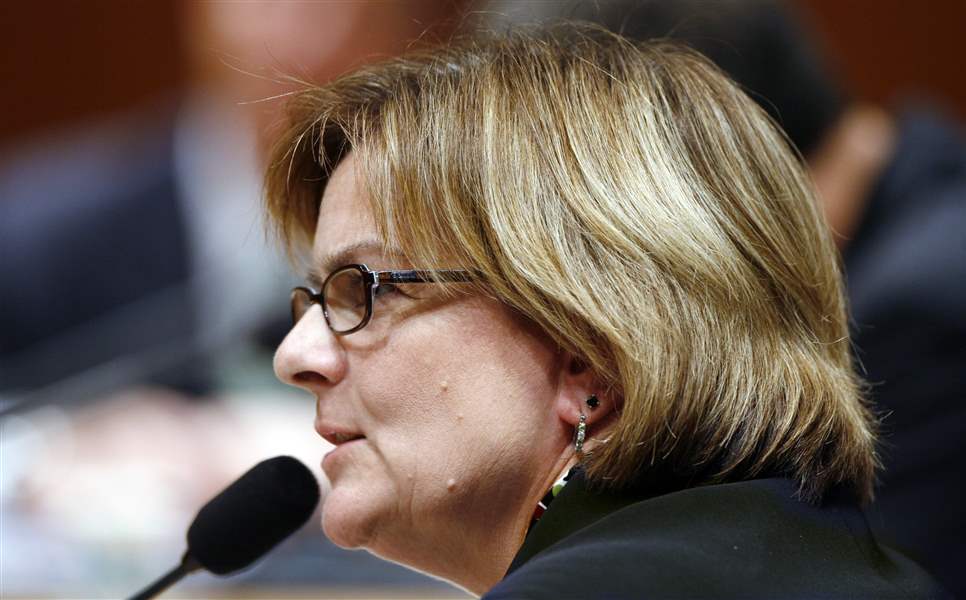
Casino gets council hearing; foes, backers make their case
10/16/2009
Issue 3 opponent Sandy Theis says the casino licensing fee is not high enough.
The Blade/Andy Morrison
Buy This Image
Proponents of authorizing casino gambling in Toledo and three other Ohio cities argued yesterday that the proposal would create thousands of desperately needed jobs and millions of dollars in tax revenue.
But opponents countered that the proposed constitutional amendment on the Nov. 3 ballot actually would result in a net loss of jobs, foster addiction to gambling, suck money away from existing businesses, and cheat local governments by levying a tax rate and licensing fee that are both paltry compared to other states.
Both sides made their cases to Toledo City Council's committee of the whole in hopes of winning an endorsement for Issue 3 or a recommendation against the proposal.
Sandy Theis, spokesman for the Truth PAC committee fighting Issue 3, said the licensing fee offered to Ohio by Penn National Gaming Inc., is low compared to other sites.
She also said that the 33 percent tax to be imposed on casino gross revenue after prize payouts could be circumvented if players bet directly with cash.
"I think there are many reasons to vote no on Issue 3," Ms. Theis said. "They want a constitutional-ly mandated cartel. If we are going to sell our constitution, we should at least get a good price for it."
Penn National, owner of Toledo's Raceway Park, and Dan Gilbert, majority owner of the Cleveland Cavaliers, are asking Ohio voters to authorize casinos on specific sites in Toledo, Cleveland, Columbus, and Cincinnati. Toledo's would be the reclaimed former waste site of Libbey-Owens-Ford on the riverfront abutting Rossford and I-75.

Issue 3 opponent Sandy Theis says the casino licensing fee is not high enough.
Penn National spokesman Andy Douglas, a former state Supreme Court Justice, outlined the predicted economic windfall for Ohio and Toledo.
He said the 33 percent tax would translate into $651 million a year statewide.
The tax distribution would include nearly $6.4 million for Lucas County; $11.3 million for Toledo, and $8.7 million for public schools in Lucas County.
Jerry Chabler, a Lucas County member of the Ohio Racing Commission and an outspoken Issue 3 opponent, said the 33 percent tax rate is one of the lowest rates in the country in states that have casino gaming.
Rates vary nationally from 8 percent in Nevada to 74 percent in Rhode Island.
He also said the casinos would have a negative impact on racetracks in Ohio, including Raceway Park.
Eric Schippers, Penn National spokesman, disagreed and indicated there actually would be a synergy between the new casino and Raceway Park.
"We have no plans to close Raceway Park," he said "We want to continue to operate Raceway Park."
The constitutional language requires a minimum $250 million investment at each site, but it does not include a deadline for development.
During the face-off yesterday, Councilmen Lindsay Webb and Betty Shultz both said they would support a resolution urging passage of Issue 3.
"I think this issue is of serious consequence for our community, and it is right for City Council to express itself on this issue," Ms. Webb said. "I think this is an issue we can't sidestep and be neutral on."
Councilman George Sarantou - a strong Issue 3 supporter - raised the point of how elected officials would explain to their constituents why they would turn their backs on a potential windfall from casino gambling when several neighboring states have legalized casinos.
Mr. Douglas quickly pointed out that they could not and that Ohio loses millions to states such as Michigan, where Ohioans spend their money at the tables and slots.
The Rev. Larry Clark, pastor of First United Methodist Church, who was among several people to testify during the hearing yesterday, said council should remember that there is a social downside to casino gambling.
"A beeline is made from these casinos to our churches to pick up the broken lives of these people," Mr. Clark said. "They are not economic development. It is a net loser. I hope that we will defeat again this ill-advised attempt to increase the coffers of the gambling interests."
Bill Delaney, owner of Delaney's Tavern on Alexis Road, on the other hand called it a "no-brainer" and urged people to vote yes because of the expected tax revenue and new jobs.
Dave Nolan, president of Destination Toledo Inc., formerly the Greater Toledo Convention and Visitors Bureau, also supports Issue 3.
He said speculation that existing restaurants would be hurt financially are false.
Some have said patrons would dine inside the casino and discontinue eating at downtown establishments.
"We represent over 300 corporate members," Mr. Nolan said. "I didn't have one phone call worried about restaurants being circumvented."
A majority of the Lucas County Improvement Corp.'s executive committee voted yesterday morning to support passage of Issue 3.
Chairman Joseph H. Zerbey IV, and members Gary Yunker, Rashmi Agnihotri, Baldemar Velasquez, and Joseph Rideout, voted in favor.
Members Keith Burwell and Derick Gant voted yes by proxy.
Mary Jo Waldock, special assistant to the president for economic development, University of Toledo, abstained through a proxy vote because the school has taken a neutral stance on Issue 3.
Contact Ignazio Messina at:
imessina@theblade.com
or 419-724-6171.